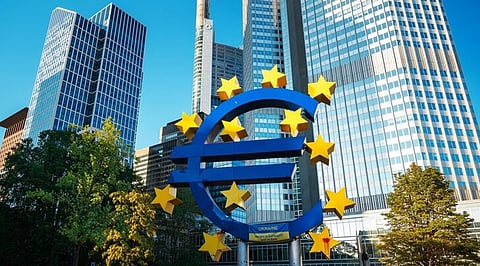

Eurozone inflation exhibited a modest deceleration in February, a development that reinforces the cautious approach adopted by the European Central Bank (ECB). According to Eurostat, consumer prices rose by 2.6% year-on-year, slightly surpassing economists' median estimate of 2.5%. Core inflation, excluding volatile elements like food and energy, also moderated to 3.1%, signaling a nuanced economic landscape across the currency bloc.
The data suggests the decrease in inflation from sky-high energy costs is cutting across the bloc. While most members recorded a dip versus January, price growth remains well above the ECB's 2% goal.
ECB President Christine Lagarde said officials need to see clearer evidence that inflation is lastingly reverting to target before considering rate cuts. Multiple policymakers echoed that sentiment over the past week.
Investors, while anticipating rate cuts by June, remain vigilant as market dynamics evolve. The likelihood of a rate cut in June is approximately 80%, reflecting a nuanced assessment of economic indicators and policy trajectories.
The ECB's forthcoming decision on borrowing costs looms large, with economists predicting the preservation of the deposit rate at 4% for the fourth consecutive meeting. However, divergent views persist among policymakers, with a faction advocating for more immediate rate adjustments to mitigate economic headwinds.
Political pressures mount as policymakers navigate economic challenges. Portuguese Finance Minister Fernando Medina underscores the urgency of proactive monetary measures amidst signs of stagnation and recession in several European economies. While policymakers express optimism regarding the inflation trajectory, concerns persist regarding wage and labor cost inflation, potentially prolonging price pressures.
Despite economic headwinds, the Eurozone job market remains resilient, with the unemployment rate at a record low of 6.4% in January. However, uncertainties loom regarding the sustainability of economic momentum amidst evolving inflation dynamics.
ECB President Christine Lagarde emphasizes the need for sustained evidence of a return to the 2% inflation target. Analysts caution against overinterpreting recent inflation trends, highlighting the underlying complexities in assessing inflationary pressures.
The ECB's outlook hinges on forthcoming data releases and economic projections. Analysts project potential downward revisions in inflation and economic expansion forecasts, reflecting prevailing uncertainties in the Eurozone's economic landscape.
While some officials anticipate inflation nearing or even falling below 2% in the near term, the timing of rate adjustments remains contingent upon evolving economic indicators and wage dynamics. Analysts remain cautiously optimistic, projecting a gradual rebound in price pressures throughout 2025.
Eurozone inflation moderates in February, offering a nuanced perspective on the region's economic trajectory. The ECB maintains a cautious stance, balancing inflation dynamics with economic uncertainties, as policymakers navigate a complex macroeconomic landscape.
Join our WhatsApp Channel to get the latest news, exclusives and videos on WhatsApp
_____________
Disclaimer: Analytics Insight does not provide financial advice or guidance on cryptocurrencies and stocks. Also note that the cryptocurrencies mentioned/listed on the website could potentially be risky, i.e. designed to induce you to invest financial resources that may be lost forever and not be recoverable once investments are made. This article is provided for informational purposes and does not constitute investment advice. You are responsible for conducting your own research (DYOR) before making any investments. Read more about the financial risks involved here.
